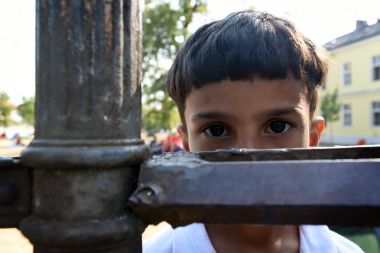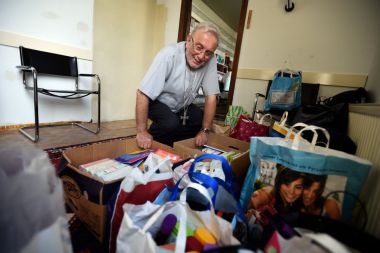Migrants in Austria: How a Syrian church in Vienna is helping victims of the bloody civil war

Under trees in the garden of the Syrian Orthodox Church in Vienna, about 50 people sit round trestle tables eating what can only be described as a feast.
There are stuffed vine leaves and peppers, flavoured rices, salads and a mound of home-made deserts that ooze honey. These come recommended by half the middle-aged women there. Someone is brewing Turkish coffee and the scent wafts over the garden.
We are absorbed into the melee. Someone slaps a huge plate of food in front of me but I don't get near it. Everyone wants to talk. I can't take shorthand notes and eat at the same time. Talking is more important, right now, than eating.
Because this isn't the standard church picnic that it looks like, with small boys kicking footballs around in the road outside. This is a meeting of asylum seekers.
Austria has the highest number of asylum seekers per capita in Europe. Some 80,000 are expected to arrive there this year alone. That follows 28,000 in 2014 and 17,000 in 2013.
Asylum requests for Austria – a country with a population of just 8 million people – rose nearly 180 per cent in the first five months of 2015.
The Church is key to helping people as they go through the asylum process, and if they are granted asylum, after it.
The people all around me represent a few extended families that were rescued when they fled Syria and brought to Austria about 18 months ago.
They came in a tranche of goodwill from the UN. Their flights were paid for by the congregation in Vienna.
Hassaka tells me that she left Syria when "ISIS captured my son". Her daughter Ruba (34) takes up the tale.
"I left just wearing the clothes that I was wearing," says this former kindergarten English teacher. "I ran away from Syria to Turkey with my brother. He was carrying his four-month-old baby. My husband ran.
"The police were chasing us. It snowed and it was dark. We were terrified. I just took my children and ran."
Once in Turkey, the family were passed from church to church. A priest put their names on a list of 500 people being airlifted into Austria because they were Christians, fleeing death.
Fifteen of Ruba's family got out. Others remain.
"I had no idea where I would end up," she says. "But I just wanted to leave Syria. It's good for the kids, but it's difficult for us. We had a good life before. Now we haven't got enough money to live."
The 600-strong congregation at the Syrian Orthodox Church is made up of people like Ruba: asylum seekers from Syria's brutal war.
The charismatic priest in charge of this flotsam-and-jetsam congregation is Chorepiskops Emmanuel Aydin.

"I've seen so many changes in the years that I've been here," he says, before breaking down in tears, his head in his hands.
"I do so little," he says. "But how can I not help my brothers and sisters?"
In fact the church is given over to helping people like Ruba and Hassaka. Its extensive side-buildings are being converted into bedrooms and bathrooms so that more than 20 people can be accommodated as they go through the asylum application process.
Once they have been granted asylum, Chorepiskops Aydin then helps find them accommodation in and around Vienna. If they can't pay the rent, he pays it. No wonder he's crying.
Then the weirdest thing happens: Jesus gets a Bible.
Bible Society in Austria has been giving the congregation Arabic Bibles for some time. It's turned up today with boxes more. Teenagers run into the building and line up to receive their own personal copy, now one of the few things they own, having left everything behind.
They kiss the Bibles and hold them to their brows in an act of reverence.
But Jesus is not among them. Jesus – or Issa, to give him his Arabic name – is a 22-year-old would-be dentist.
"I decided to leave Syria because ISIS were killing women and babies," he says. "They asked if we were Christians. They said if we didn't convert to Islam then they'd kill us."
The family moved out of their home and went into hiding, twice. Then finally, when ISIS caught up with them, they fled Syria.
Issa is dismissive of the notion that he might have considered converting to Islam. "My faith has not changed," he says. "God helped me to end up here which is a good thing for me."
He says this sitting in a room piled high with office chairs, which he shares as a bedroom with four other men, while renovation works are going on. He says this having been granted asylum, but being unable to resume his dentistry studies.

"You really want to be a dentist?" I say. "All that poking about in people's mouths." He laughs, a real genuine laugh and says, "Ah well, it's a good job."
And so it should be, if he can ever manage it.
Then Clare, the photographer, asks him if he's got a Bible. "There are ones we can read downstairs," he says.
"Would you like one of your own?" I ask.
'Yes, I really would," says Issa. So someone from Bible Society in Austria finds a copy and presents it to him, and Issa – or Jesus – smiles.
And I leave thinking that I've seldom been to such a welcoming, friendly, wonderful church; impressed with how they are helping asylum seekers like Issa; and still not having had that cup of Turkish coffee.











